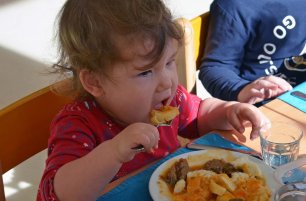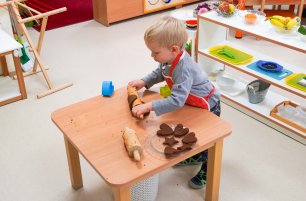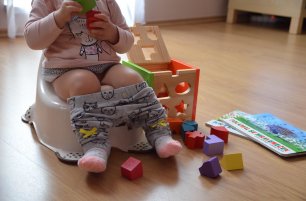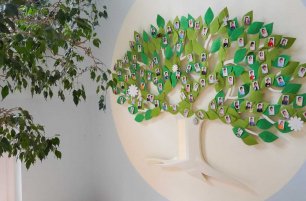What does Grace and Courtesy look like in practice?
The purpose of the Grace and Courtesy curriculum in Montessori is to offer our children the best possible assistance on this path. Explaining and modeling clearly, we share the most harmonious ways of behaving, relating and communicating, and help children practice and master them. Step by step, from the simplest skills (like saying “excuse me” or shaking hands) children build a “vocabulary” of actions that allows them to act appropriately and feel confident in social settings. How do we actually practice it in particular age groups?
0-3 years: It’s All About Direct Involvement
In early childhood there are only a few Grace and Courtesy lessons that can be presented and practiced by the child; most of the curriculum lies in how we as adults act towards children and towards one another. When interacting with small children, this includes speaking to them directly and not over their head, getting down to the child’s level, and respecting their personal integrity – for example, not requiring a small child to shake your hand or hug you upon greeting. With older toddlers, we may practice polite phrases and greetings, covering mouth when sneezing, or knocking on doors.
Tips:
-
Prioritize participating in family meal times, events and celebrations.
-
Model polite greetings and phrases (“please”, “thank you”, “excuse me”).
-
Practice expressing feelings, wishes, wants and preferences (“I would like...”).
3-6 years: When Friendships Are Born
The Primary years are when personal grace and courtesy skills come to the forefront of the child’s interest! Newly social, preschool children are finding themselves needing to navigate conflicts or treat friends well. Concrete lessons include requesting help, solving disagreements, taking turns and sharing.
Tips:
-
Practice solving conflicts between siblings and friends, with and later without adult mediation.
-
Explain and require polite behavior in different settings (greeting guests, introducing oneself, in restaurants, theatres or sport facilities).
-
Show how to offer and ask for help.
-
Actively participate in cultural and religious events.
6-12 years: What Does It Mean to Be a Community
In Elementary, children become concerned with group dynamics, justice and fairness. The Grace and Courtesy curriculum includes class meetings, discussing and setting rules and experimenting with different forms of social order. Also, at the age when slapstick and body humour becomes the pinnacle of hilarity, children practice how to politely and appropriately react to belching, farts and other assorted bodily functions.
Tips:
-
Have children responsible for running errands and communicating with representatives (at shops, post office, bank).
-
Encourage your child to make appointments and phone calls.
-
Together, practice writing greeting cards and letters to friends and family.
12-18 years: Entering the Great Wide World
Adolescents widen their view of the world: from the school and local community to society. Their Practical Life is now real “activities” like running a small business, raising funds for charity or volunteering, and must therefore be accompanied by Grace and Courtesy lessons in areas such as customer care, communicating with the authorities or advocating for a cause. It may seem too “real” for education, but that is a key principle of Practical Life as a whole: that it is entirely based in reality and affords as much so-called real-world experience as possible and appropriate for the developmental stage of the young human being.
Tips:
-
Encourage the adolescent to be active in community and local politics – connect with the municipal offices and address local issues that affect them.
-
Seek out volunteering and service opportunities (like local charities, pet shelters, or needs of neighbours).
By Michaela Tučková, IMSP Toddler Teacher
Want to learn more? Read our next article:




